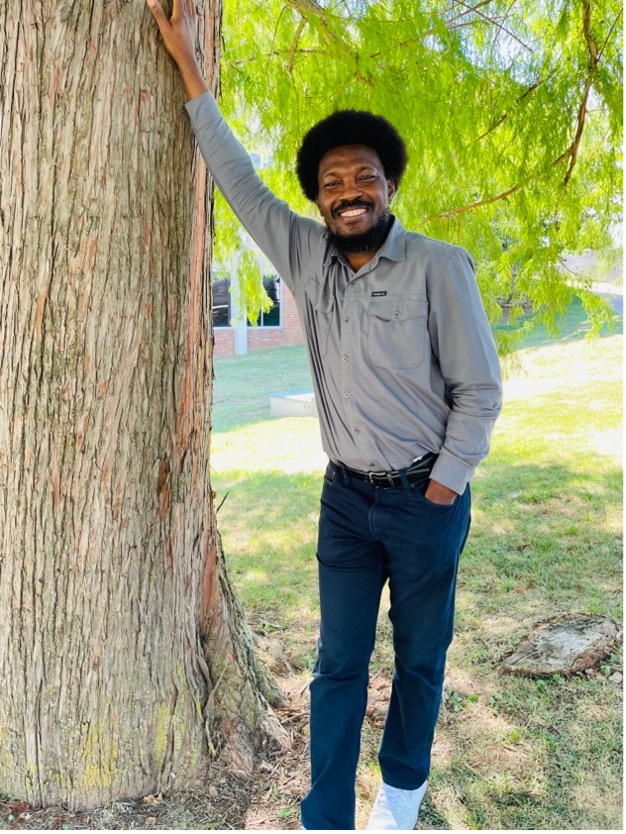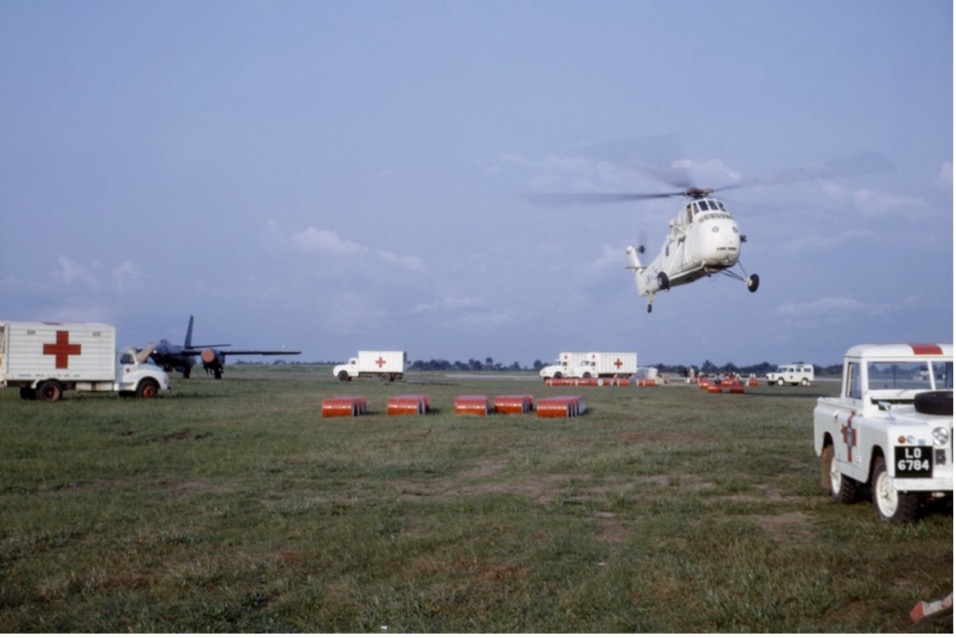
Never Far Apart: OSU’s Taiwo Bello brings global history to life
Wednesday, November 5, 2025
Media Contact: Elizabeth Gosney | CAS Marketing and Communications Manager | 405-744-7497 | egosney@okstate.edu
When students walk into Dr. Taiwo Bello’s classroom, they quickly realize they’re entering more than a history course.
Whether he’s tracing the legacy of African independence movements or leading a discussion on the ethics of humanitarian intervention, Bello wants students to grasp the global present they live in.
Now in his second year on campus at OSU, Bello is an assistant professor and the newest member of the Department of History. He is also affiliated with the university’s Center for Africana Studies. His research and courses, including Modern African History, World History, Black Resistance, and History of the Present, explore how people across continents have struggled for freedom, dignity and justice.
“Dr. Bello is one of the best professors I have ever had,” said Dallas Cox, a history major and student in Bello’s World History course. “In class, he encourages us to debate and engage with each other, which I feel is an important skill in any field. And he always has time after class for students.
“He wants to see us succeed not just in class but in life as well.”
For Bello, the connection between his research and preparing students for life in a complex world is the point.
“History gives us the tools to ask hard questions,” Bello said. “I want students to see how ideas, conflicts and communities have always been globally connected. History shows us that the local and the global are never far apart.”
Bello’s colleagues say that what stands out most about his work is its combination of moral seriousness and pedagogical warmth.
“Dr. Bello blends a commitment to rigor with a deep commitment to student success,” said Dr. Brian Hosmer, head of the Department of History. “His classes expose students to difficult topics and the experiences of real people. He draws students into these conversations in a supportive fashion that asks them to examine their own preconceptions. We’re lucky to have him here.”
From Lagos to Stillwater
Bello’s path to OSU began in Lagos, Nigeria, where his curiosity about history took root. He earned his bachelor’s degree at the University of Ibadan before pursuing a master’s degree at the Graduate Institute of International and Development Studies in Geneva, Switzerland. He later moved to Canada, where he completed both an MA and a PhD in History at the University of Toronto.
Before joining OSU, Bello held a Faculty of Arts & Science Postdoctoral Fellowship in African and African Diaspora History at Toronto. There, he was a Carmen Brock Fellow in sub-Saharan African History and began building a reputation for work that bridges African, global, and humanitarian histories.
His research and teaching reflect that breadth. Bello’s interests span gender history, war and society, conflict studies and Black diaspora studies. He is particularly committed to exploring the history of human rights and humanitarianism, including how global networks — religious, political, civic — have shaped the stories of both victims and survivors.
Teaching History that Speaks to the Present
This semester, Bello is teaching History of the Present: Global Perspectives on Gender, Violence, and Genocide. From Ukraine to Sudan to Gaza, current headlines remind students daily of the topicality of their course and its meaning in their own lives, now and later.
“Students are deeply aware of the world around them,” said Bello, who strives to help students make sense of the forces driving such violence and the moral questions they raise. “They’re asking how societies reach the point where violence becomes normalized.”
The conversations are lively and, at times, personal. Some students with family histories of migration or socioeconomic hardship find themselves reflecting on how the past has shaped their own identity.
“Wherever the future takes me after my university career concludes, I will remember the incredible empathy Dr. Bello displays as a professor and as a person,” said history major Parker Catron. “He deeply cares about the subjects he discusses, and always seeks to emphasize the personal, firsthand accounts of victims of violence and genocide.”
Researching the Human Costs of War
Bello’s own scholarship centers on one of the 20th century’s most devastating conflicts: the Nigerian Civil War, also known as the Biafran War (1967–1970), and the politics of gender and the politics of humanitarianism in that conflict.
“Dr. Bello is highly knowledgeable, prolific and one of the best thinkers of his generation," said his colleague Dr. Saheed Aderinto of Florida International University. "To the best of my knowledge, he is the first to write a monograph on women in the Biafran heartland during the civil war."
It's an approach, Aderinto added, that gives "significant visibility to women of diverse generations, ages, social classes and identities.”

When it comes to humanitarianism in the war, Bello has focused on the interventions that Canadian churches pursued. “Walking Together: Canadian Churches’ Campaigns for Biafra during the Nigerian Civil War,” published in The Canadian Historical Review, examines how Canadian religious groups responded to mass starvation in the Biafran enclave.
The war’s blockade caused catastrophic hunger, and Bello’s research shows how Canadian church organizations mobilized to deliver relief — sometimes in tension with their own government’s cautious diplomacy. His work uncovers how humanitarian campaigns, even when well-intentioned, become politicized.
“Studying humanitarianism allows us to see how empathy operates within power,” Bello said. “It’s about who gets to define suffering, and who gets to respond.”
Beyond his publications, Bello contributes to shaping the broader field of genocide and conflict studies. He was recently invited to serve as a founding editor of Scholar’s Corner, a new online platform affiliated with Genocide Studies International, published by the University of Toronto Press. Bello also serves as president of the African Military Studies Association. These roles place him in dialogue with scholars worldwide who are rethinking the intersections of colonialism, conflict and post-colonial statehood in Africa, as well as the role of African diasporas.
“Taiwo's work on Biafran diasporic activism during and after the war significantly contributes to our understanding of conflict activism and postcolonial African histories of war," said Dr. Chigbo Anyaduba of the University of Winnipeg.
Future Work
Looking ahead, Bello is developing several book projects. One explores how Nigeria’s transnational diplomacy shaped and sustained the armed resistance of African liberation movements. Another investigates Biafran refugees’ resettlement in the United States, including Texas, and the role of American organizations in African decolonization.
At a core level, Dr. Bello’s work insists on the fact that Africa has always been central to the making of global history. That means he is poised to make important contributions to not only OSU's history department but also to OSU’s program in Africana Studies.
“Dr. Bello’s work helps us understand how the enduring legacies of colonialism continue to shape patterns of war and political instability in modern African states,” said Dr. Jacob Mwita, teaching assistant professor of Africana Studies at OSU. “His expertise in these areas significantly enriches the intellectual life of the Center for Africana Studies at Oklahoma State University."
